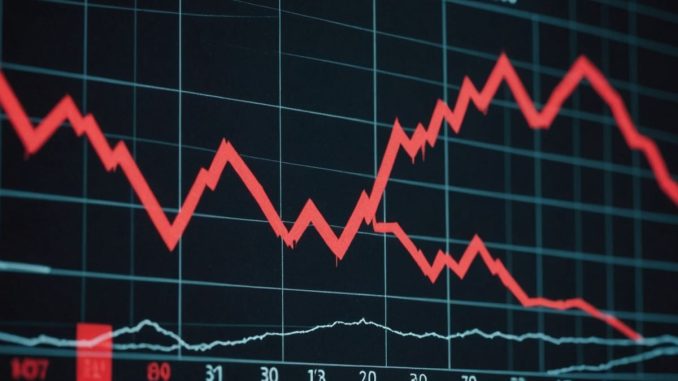
The stock market experienced a sharp decline on Friday, with the Dow Jones Industrial Average dropping 611 points due to increasing concerns about a potential recession. Weak hiring data and rising unemployment rates have intensified fears that the Federal Reserve may have delayed lowering interest rates for too long.
Key Takeaways
- Dow Jones Industrial Average: Fell 611 points, or 1.5%, to close at 39,737.
- Nasdaq Composite: Dropped 2.4% to 16,776.
- S&P 500: Declined 1.8% to 5,346.
- Unemployment Rate: Increased to 4.3% in July from 4.1% in June.
- Nonfarm Payrolls: Expanded by 114,000 in July, below the forecast of 175,000.
- Federal Reserve: Faces pressure to lower interest rates at the next meeting.
Market Performance
The Dow Jones Industrial Average shed 611 points, or 1.5%, to finish at 39,737. The tech-heavy Nasdaq Composite tumbled 2.4% to 16,776, while the broader S&P 500 fell 1.8% to close at 5,346. The selloff was driven by weak hiring data and rising unemployment rates, which have sparked fears of an impending recession.
Economic Indicators
The Bureau of Labor Statistics reported that U.S. nonfarm payrolls expanded by 114,000 in July, significantly below the forecast of 175,000. Over the past year, the U.S. economy has created an average of 215,000 jobs per month. Additionally, the June jobs report was revised lower by 27,000 jobs to 179,000. The unemployment rate increased to 4.3% in July from 4.1% in June, triggering the Sahm Rule, a recession indicator with a perfect track record over the past 50 years.
Federal Reserve’s Dilemma
The weak employment report has put increasing pressure on the Federal Reserve’s rate-setting group, the Federal Open Market Committee (FOMC), to lower the short-term federal funds rate at the next meeting. As of August 2, futures traders assigned an 80% probability to the FOMC enacting a half-point cut in September, up from 22% a day ago. The odds of a quarter-point cut dropped to 20% from 78% a day ago.
Impact on Big Tech
Mixed-to-disappointing earnings from major tech companies have also contributed to market volatility. Amazon.com (AMZN) stock fell 8.8% after reporting mixed earnings results for its second quarter and issuing a third-quarter outlook that fell short of expectations. Despite this, Amazon’s AI initiatives continue to be well-adopted and supported.
Apple (AAPL) stock rose 0.7% after reporting better-than-expected earnings for its fiscal third quarter. Apple’s revenue increased by 4.9% year-over-year to $85.8 billion, driven by 14.1% growth in services to $24.2 billion. Earnings per share improved by 11.1% from the year-ago period to $1.40.
Intel’s Struggles
Intel (INTC) stock plunged 26% after missing top- and bottom-line expectations for its second quarter and providing a weak outlook for the third quarter. The company announced a 15% reduction in headcount and the temporary elimination of its dividend as part of its cost-cutting measures. Intel’s stock suffered its worst session in half a century, closing at levels last seen more than 10 years ago.
Conclusion
The stock market’s sharp decline on Friday highlights the growing concerns about a potential recession. Weak hiring data and rising unemployment rates have intensified fears that the Federal Reserve may have delayed lowering interest rates for too long. Investors will be closely watching the Fed’s next moves and the performance of major tech companies in the coming weeks.

